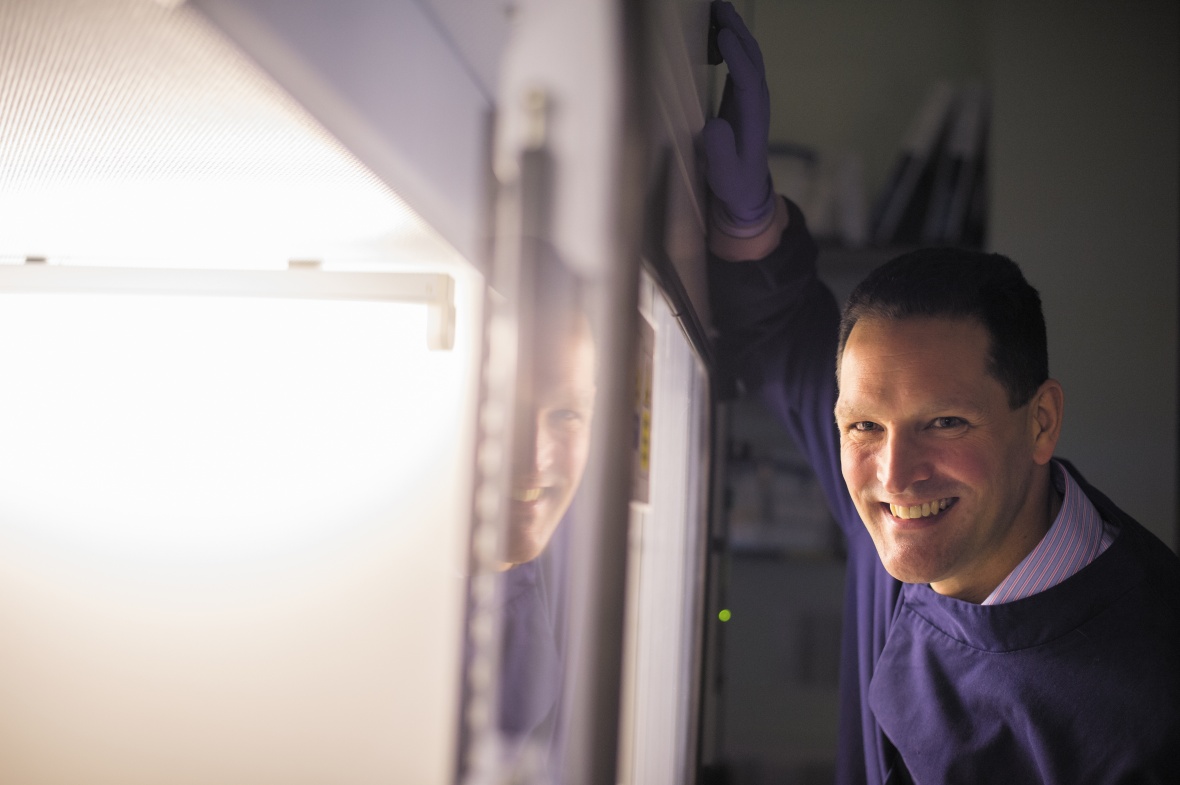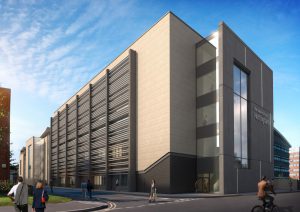
September 26, 2018, by Rob Ounsworth
New Director of Centre for Biomolecular Sciences
Professor Chris Denning has been appointed as Director of the Centre for Biomolecular Sciences (CBS) as it undergoes a £23m expansion to underline its reputation as a hub of world-class interdisciplinary research.
The project extends the existing £40m CBS buildings, where areas of research excellence include the Centre for Synthetic Biology, and the National Biofilms Innovation Centre, as well as medical chemistry and protein engineering.
The centre’s extension will bring together experts in serious diseases including cancer, cardiovascular, liver, bone and respiratory conditions to encourage collaboration and drive new breakthroughs in treatment and diagnosis.
The CBS extension will house academics, researchers and PhD students across five floors of state-of-the-art laboratories and research space and bring together experts from six separate University of Nottingham sites.
Professor Denning, who heads the Stem Cell Biology Unit at the CBS and also leads the transdisciplinary Regenerative Medicines and Stem Cells Research Priority Area, said: “It is a privilege to take on the role of Director of the Centre for Biomolecular Sciences.
“This is an exciting time for the University of Nottingham. The CBS expansion will be completed in November 2019. By interlinking four of its buildings with world-class facilities, we will create a flagship of interdisciplinary enterprise and collaboration for 800 staff at the heart of the University’s main campus.”
The gene jockey – find out more about Professor Denning and his research
He added: “Our vision is that through chemical and biological discovery and engineering, we will diagnose, treat and cure disease, and provide security for quality of life. Our talented researchers, academics and clinicians will achieve this by tackling important questions for cancer, regenerative medicine, microbiology and genomics, through to re-engineering bacteria to produce valuable advanced fuels.”
Professor Dame Jessica Corner, Pro-Vice-Chancellor for Research and Knowledge Exchange, said: “I am delighted at Professor Denning’s appointment. Chris is a world leader in genetic engineering and stem cell therapies as well as an inspirational advocate of the power of transdisciplinary discovery. Under his leadership, the Centre for Biomolecular Sciences will bring together remarkable researchers from complementary fields under one roof, working together to deliver advances that change lives.”
Among the research groups being housed in the CBS extension are:
- The Division of Cancer and Stem Cells in the School of Medicine brings together 30 research groups led by scientists and clinicians with expertise in basic biological and translational research. This includes oncology, encompassing cell and molecular biology, immunology and clinical cancer medicine. It also includes stem cell biology that will add understanding of conditions which affect the heart, liver, lungs, gut, blood, brain and bone. Collectively, the work will advance therapeutic cell biology and lead to the development of new and safer drugs.
- The Nottingham Breast Cancer Research Centre brings together world-leading breast cancer researchers including oncologists, surgeons, pathologists and cancer biologists with the aim of detecting the disease early, stopping it from spreading and treating it effectively.
- The Cancer Pathogenesis Research Group in the School of Veterinary Medicine and Science aims to advance the prevention, diagnoses and treatment of cancer in people and companion animals.
- Researchers from the Children’s Brain Tumour Research Centre are working to develop our knowledge of childhood brain tumours, pioneer new research and treatments and to raise awareness around the illness.
- The Division of Respiratory Medicine in the School of Medicine studies a variety of lung diseases including asthma, COPD, cystic fibrosis and pneumonia. The four research groups cover genetics, how genetically inherited diseases respond to some medications, how the diseases operate at a molecular level, translational research (including medical imaging) and clinical trials.
- The Division of Regenerative Medicine and Cellular Therapies in the School of Pharmacy aims to provide develop and better understand new biomaterials for use in tissue regeneration, to treat disease and improve quality of life. It has a focus on using innovation to drive discovery in diseases that are untreatable by current medicine.
The building will also house the new Centre for Cancer Sciences (CCS), which will take a pioneering approach to create a new centre of excellence in the detection and treatment of cancer, while training a new generation of cancer researchers to tackle the disease head on.
No comments yet, fill out a comment to be the first


Leave a Reply